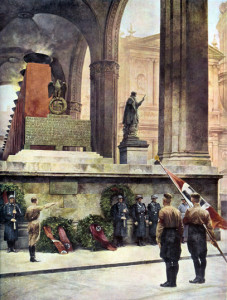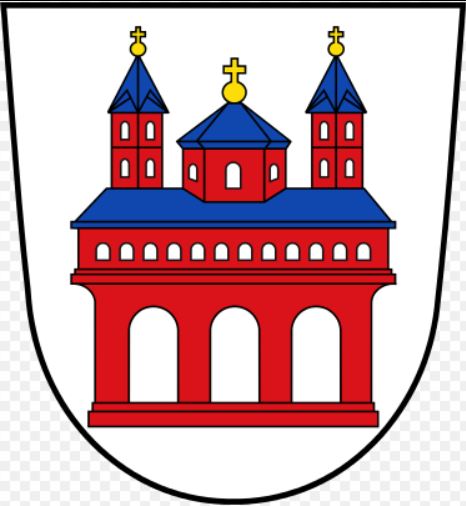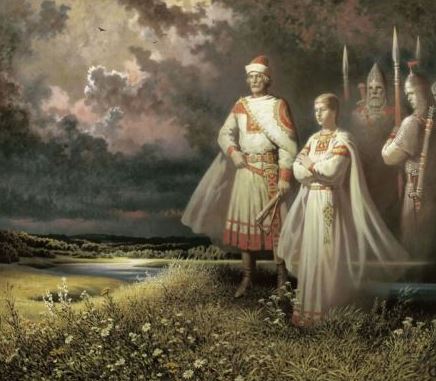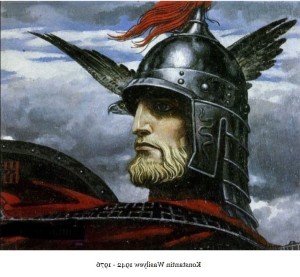germanvictims.com - …Look at the photographs-those German faces and uniforms, from the confidence of 1933 to the smash of 1945 - look at them over and over until you begin to see why this was the end, the last flicker of white life…
The author makes some very good points through irony. This was an article in the paper Instauration on January 1, 1979; Wilmot Robertson, Editor
“INSIDE OUT” with CHOLLY BILDERBERGER
It was late autumn of 1938. I was crossing back into France from Germany with an old school friend, an American diplomat and spymaster whom I shall call Davis, after a session in Berchtesgaden during which we had seen Hitler. We were driving - Davis had a very uncomfortable open car, I remember - and as we pulled away from the frontier post he smacked his hand down on the top of the door frame and said, “But who cares!”
“But who cares about what?” “About what the damned Germans do or don’t do. I mean . . . here we are in France. And we have all been taught from birth that France is good and Deutschland is bad. Frenchmen - and Danes and Dutchmen and Swiss, even Poles and Czechs and Italians - are civilized, which makes them superior to Germans, who are not. Frenchmen and all other Europeans, to a lesser but appreciable degree - know how to live, how to make love, how to appreciate the finer things in life, above all how to carry the torch of culture and civilization from one generation to another. With the Germans, such attributes are only a veneer at best. They remain barbarians, no different from the hairy beasts the Romans met, and are out to drag everything down to their level. Isn’t that the general picture?”
“Just about.”
“But you know and I know that all this talk of civilization is nonsense. France and the rest of Europe, and Britain - and our own sainted America - are really squalid enterprises run by the very unattractive upper c lasses. U.S. civilization in the deeper sense is a mirage. The Germans know this in their bones and hate the sham of it. Being Germans, they don’t know what they know; they can only oppose it with instinctive grunt and grind. But the closer they get to their appointed mission - which is, I suppose, to tear it all down - the more ‘civilized’ these barbarians begin to look. We know perfectly well that they’ re going to romp all over Europe. You and I, like everyone else, especially in our class and our so-called responsibilities, are supposed to find that very bad. But I say, Who cares! Who cares what happens to France, a nation of very rude, very limited people? After all, we don’t call them frogs for nothing. Would they be any worse, any more boring, under the Germans? I very much doubt it. It might even be good for decidedly un-merry old England.”
Later he talked about the Germans we had recently met at all levels. “They are alive-did you notice that? They are living, the first white men to stand up in Europe for hundreds of years. They will not put up with the tyranny of mindless industrialism and business, of Jews and pseudoculture. They’re going back to the manly arts. And don’t their women know it! Now Hitler himself is rather different, the alchemist who says, ‘You say you want to fight? You say you don’t like Jews? Et cetera. Well, I’ll show you how you can take care of that.’ They’ve put their trust in him completely, which may be a mistake. But don’t you see, it’s better to be naive enough to make a mistake like that than to be incapable of caring enough to try anything, the way we are.”
We met in Switzerland in 1940, after the Germans swept through France, and he said, “I still feel the same way, and I notice that an awful lot of Frenchmen do, too. The Germans are going to lose, of course, and you and I will help to do them in, but I feel as though I’m killing some last spark of manhood in myself. Knocking off Germany to make way for the century of the common man, read Jews and other unattractive types in charge, is hardly an honorable occupation. We’re really awful people.”
I didn’t see him again until 1944 in Italy. “I have nothing to add,” he said cryptically. “Nothing has changed. Someday I’ll tell you more.”
By the time the war ended, he had become mildly famous and full of honors. Time called him “one of the architects of the Allied victory.” We met occasionally but he did not tell me more. In fact, his conversation was irreproachably pious, and when I prodded him, obliquely but definitely, about culture and Germans and Hitler and other matters we had discussed, he only smiled and changed the subject. After 1960 we saw each other seldom, and, finally, not at all. He died last year.
Six months ago, his wife sent along a sealed envelope with my name on it, explaining that it had been found among his papers. Inside was a long memo, unedited and rough, but extremely pertinent, as can be seen from these excerpts:
“I was not frank with you after the war because I was so shaky. It wasn’t that I had gone back on what I had said earlier, but that I realized it was so much worse than I had imagined . . . Forget all the political-military ‘facts’ the silliness and viciousness of Nazism (above all, its inefficiency), queer officers, Jewish whines, and the modern-day Nazis who really believe all the guff. All that is entirely incidental to the important core, which is altogether a question of life versus death. Fix on that and forget the rest- it’s irrelevant to a consideration of what really happened spiritually, which is what counts. And what didn’t happen. To us, more importantly than to them. Why we now are as we are.”
“Cast back to visual memories, impossible-to-forget images before and during the war. Those crazy German parades and meetings, the hundreds and thousands cheering their hearts out so blindly . . .the glamor, if I may dare say so, of the sweep through France, Rommel in Africa, the tremendous try in Russia, the desperate retreats in Europe. . .the end, finally, in full horror in Berlin. Look at the photographs-those German faces and uniforms, from the confidence of 1933 to the smash of 1945 - look at them over and over until you begin to see why this was the end, the last flicker of white life. Not ideologically, of course - Nazism was as dreary as any other system, I’ve already conceded that - but in terms of vitality compare them with us, even as we were then. Look carefully at Ike and Monty (and draw on memory!), and then at Kesselring and Rommel, for example, and even the seniors, like von Rundstedt. Ours are dead men, bureaucrats disposing of living men.”
“Do you understand what I am saying? It was Iife versus death, and death won. We realized it when it was over, of course; at least a lot of us did, in varying ways suddenly Roosevelt and Churchill were not gallant leaders, but tiresome old fools who had made the world safe for the undesirable minorities. Not even villains, just tiresome bores. . . And Stalin? Well, he himself had some vitality, but the Russians themselves are so far down as people to begin with that true vitality is a dream for them, rather like heaven for the Christians. Of course, in the inverse morality play in which we live, the Russian triumph - then and after - is a victory for inertia.”
“If there was a genuine villain, it had to be Hitler, the devil who led the whites to fight each other and destroy their world and their self-respect and their vitality. It is perfectly true that he gave America and England no choice. We couldn’t have joined forces with him because there was nothing there to join. He was a jesting devil whose function, evidently, was to ruin through the granting of wishes. You asked for it and Hitler gave it to you. The Germans wanted war and life and the end of nine-to-five necktied morality, and he rubbed his magic lamp and gave it to them. The Americans and English wanted to stamp out ‘evil’ no matter the consequences, including self-castration, and he rubbed the old magic lamp again and gave it to us. There was a hard side to that lamp, though. You couldn’t do it over again. Once the Germans chose, they couldn’t choose again. Neither could we. Hitler closed the door to any further talk about race and life and vitality. He was hard, but then all devils are. No, we had no choice, given the course of our history after the Civil War and that of the British after the Restoration. We were both anti-life and pro-eunuchism, so knocking off the Germans was the logical, unavoidable next (and last) step. We’ve been wandering around in a daze ever since . . . In effect, Hitler said, ‘Get up on your hind legs and join us in taking over the world and running it to suit all of us whites - or fight and destroy us and end up being run by the rest of the world.’ We could not do the first, so we’ve gotten the second.”
“But I really have to contradict myself in saying earlier that we had no choice given the course of our history. I suppose what I meant was that we had no practical choice- imagine a pact with Hitler getting through Congress. Imagine Hitler keeping his word, and so on. However, we did have a theoretical choice, in which America and England couId have joined with Hitler in ruling the world and simply waited out his death or killed him off. Forget Congress, forget everything, we could have done it. What was really missing was the will to live. We didn’t have it, which is why the choice was impossible. Or should I say that enough of us didn’t have it? In any case, now we pay the penalty of having made the anti-life choice.”
“It’s this question of life which occupies me more and more. Funny thing to be saying as one nears the grave, but I don’t mean it as the opposite of death. Yes, well, I may, at that. I suppose I’m now more conscious of dying, being so much closer to it, and I’m not afraid of it, but I hate dying without having Iived as fully as I might have . . . I truly believe that the conditioning from family and class and Hotchkiss and Yale and Stale and OSS and CIA have finally dropped away, and I see what I could have seen all along if I had had the wit to allow myself to see. . .”
“The endless images, stamped in my consciousness forever - why continue to deny them? Hitler smiling back at us that day at Berchtesgaden, very much the man of the world, smiling at us but about the Germans, with the apparent affection of an outsider who will do what he can, but who is not in the game.
. .The electric vitality of the whole country then- isn’t it fitting that it was and is called ‘lack of true vitality’ by the Lillian Hellmans and the rest, Jews and non-Jew s alike, all of whom, essentially devitalized from the beginning, naturally had to inverse reality and call black white? Those German officers at Berchtesgaden, in those preposterously vital uniforms, bursting with innocent energy, cavorting around Hitler like a bunch of unthinking puppies, with no idea of what we were planning for them, in unspoken concert with Hitler. We and he were the real rogues, the conditioned killers of simpler people.”
“When they went into the bag, from Tunisia on, those uniforms were pretty tattered and the superficial steam was gone, but there was still vitality, and certainly pride of life. I remember the young princess saying to me in Sicily with quiet flatness, ‘The Germans were men. The Americans and English are children.’ A sentiment I found echoed all over Europe as we moved in after them, especially by women. Well, by God, on the whole they were men, that’s what I’m trying to say. That finally sank in on even the most obtuse Americans and English chasing them.
The retreating enemy were men, fighting on in a hopeless cause as none of us would have done. They’d made their choice and it was the wrong choice and now they had to pay for it. I may be exaggerating, but I think now that we all knew they were better men than we were and that it was crazy to be killing them, that we were killing something of ourselves, probably the best part of what was left of us. We knew it, but we never said it, because, you see, we couldn’t. We simply couldn’t; it would have gone against all our training. We had been taught that anything and everything was more important than life, than sheer vitality, so we could knock it off without a qualm. If deep down some almost atrophied instinct told us otherwise? Why, we just stifled that instinct and kept shooting.”
“And what else could we have done? What a dilemma! If we had been true to that instinct, it would have meant going against country, well-being and such traditions as had accumulated since the Civil War. Treason. Frightful, unthinkable. And yet . . . what is more important than the instinct of life? Nothing. What else is there, after all? Nothing. An insoluble dilemma, which no one solved, but which everyone was left stuck with. In the end I felt a tremendous fool for having fought and beaten the Germans. Irrational, perhaps, but there it was.”
“The postwar world confirmed that sense of foolishness. La Belle France and the rest of Europe and all of America were certainly more unpalatable than anything one had seen in Germany before the war. If it wasn’t retrogression, then what was retrogression? I remember coming out of the Plaza Hotel one day on the Central Park South side and walking east, and passing that endless procession of French Jewesses who lived there (and still do, I suppose) - tough little women with poodles, all of whom had ‘escaped’ the Nazis, with millions, evidently. An impartial observer would have been hard put to find a spark of genuine life in them, to say nothing of ‘civilization,’ and I remember wondering what madness had led us to enthrone them as models of vital culture and to annihilate the Germans as death-dealing barbarians. Incomprehensible.”
“On the other side of the coin, on a skiing trip to Austria some years later I
met an ex-ski trooper there, by then a simple Austrian farmer again. We skied together occasionally, and avoided talk about the war. But one afternoon it did come up, as he said that his life now was boring, if safe. ‘The war was dangerous, but we were alive,’ he went on. ‘We were alive in that whole period, from 1933 until 1945. We had twelve years.’ He shrugged his shoulders. ‘I guess I shouldn’t complain.’ I was naturally rather undone by his use of ‘alive,’ my private word for so long. A t any rate, I was man enough, at least for once, to say to him, ‘Well, we didn’t have twelve years, we didn’t have any years. And now we never will.’
Of course, he was an exception. Contemporary Germans are as anti-life as we could have hoped when we were plastering their cities. And more importantly, when we taught them later how naughty the Nazis were which was, sadly and paradoxically enough, teaching them that life itself was wrong. Being Germans, they took the lesson to heart and are now formidably deadened. Have you ever seen one of those ceremonies where the chancellor or some other top official goes to some Jewish shrine and grovels about with a skullcap on, flanked by the stern-eyed Jews who nod approvingly when he tells them that the Germans bear a permanent ‘guilt’? Hitler, the satanic imp grinning from the grave, has ruined everyone.”
“But he couldn’t have done so unless the weaknesses had been there. In the case of the Germans, the weakness was their naiveté and their greedy innocence. They were so grateful to Hitler for giving them the opportunity to live that they never thought to ask what the price was. A child could have told them in 1938 that the rest of the world already hated them and that Hitler had no real program and that he was going to Pied Piper them into disaster. A non-German child, I should add. But perhaps they wouldn’t have cared anyhow, reasoning that twelve good years were worth anything.”
“Do you see what I’m trying to say? Along comes Hitler and promises ‘life ‘ You’re a simple German and don’t k now what a rascal he is, what disasters he wilI bring on you. So you respond to life and are destroyed. And along comes your conquerors who tell you, in essence, that it was wrong to respond to vitality, surely an immoral position. In actuality, one shouId have contempt for people who don’t so respond. And respect for those who do - the Germans should be heroes in that sense if in no other. With all their faults and limitations, they were true then to the deepest demand of all. If you can’t answer that call, response to the rest - intellect, ‘decency,’ etc. doesn’t matter.”
“Contempt should be reserved for. . . guess who? In our case, the weakness was hatred for life itself, surely a greater flaw than any the Germans had. And we were so grateful to Hitler for giving us the opportunity to crush life that we never thought to ask what the price was. And a non-American non-English child should have been able to tell us in 1938 that after our anti-life orgy, also Pied Pipered by HitIer, we were going to be finished. But perhaps we wouldn’t have cared anyhow, reasoning that a really superb orgy was worth anything. “The analogy may be too pat, I don’t know. And don’t care. Whether I can say it convincingly or not is unimportant. At bottom that is what happened, though, and the truth will out some day. It’s already started in a mild way - see, for example, David Irving’s books. He has humanized Hitler and the Wehrmacht, and put the essential manliness and wit of the German generals into perspective. Contrast it with the ludicrous aimlessness / viciousness of the OSS playboys (as no one knows better than you), and the termites like Eisenhower. You remember . . .”
“It will increase, I predict, and in time -10,000 years? it will be seen as it really was. For now, of course, we shall remain in the darkness with a few faint rays of light: At the very end of Irving’s book on Rommel, published in this country in 1977, the last paragraph is surely a coded reminder, don’t you think? ‘What monuments now stand to Rommel? There is a bare wooden cross above the grave that holds his ashes. And there is a stone memorial at Kilometer 31 before Tobruk on the Via Balbia, commanding the graves of all his fallen soldiers, the “Africans” of whom he was so proud - Prittwitz, Ponath, Summermann, Neumann-Silkow, Bismarck and so many more. Once a year survivors come to greet them in his name, and that is his other monument: he lives on in their memory. And when the hot storm blows, and the skies cloud over with red, flying sand, and the ghibi begins to howl, perhaps they hear once more a Swabian voice rasping in their ears. “Angreifen!” “Attack!” And then a fainter cry ”Mount up!” And then the thunder of the panzer columns starting their engines and rolling off eastward against the enemy ‘ ”








